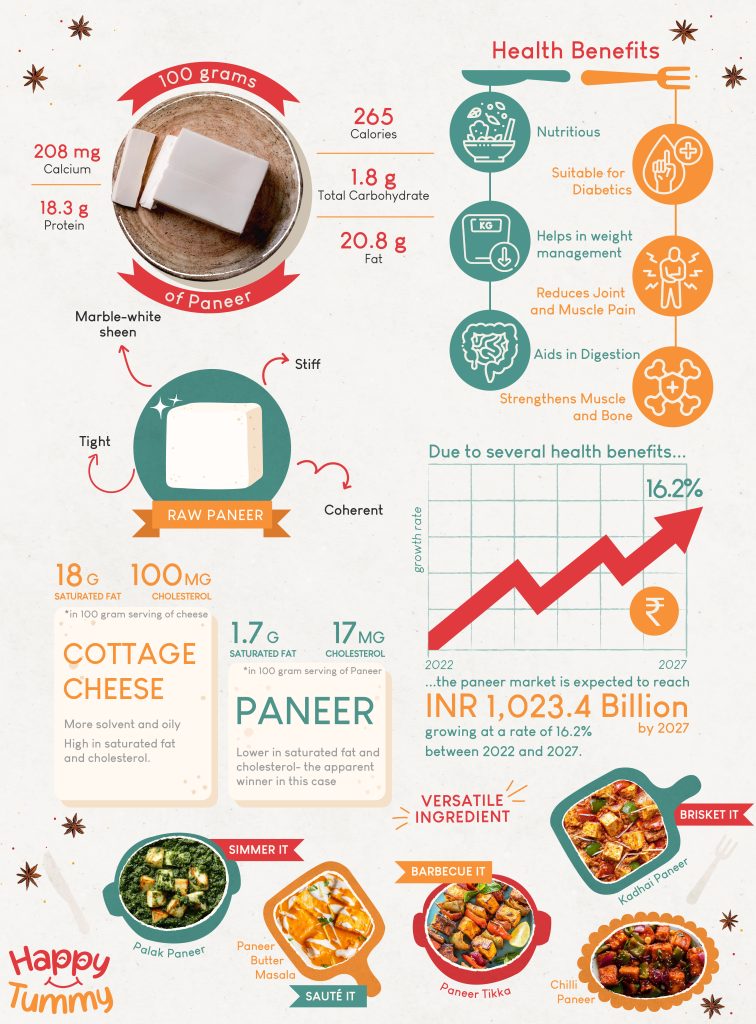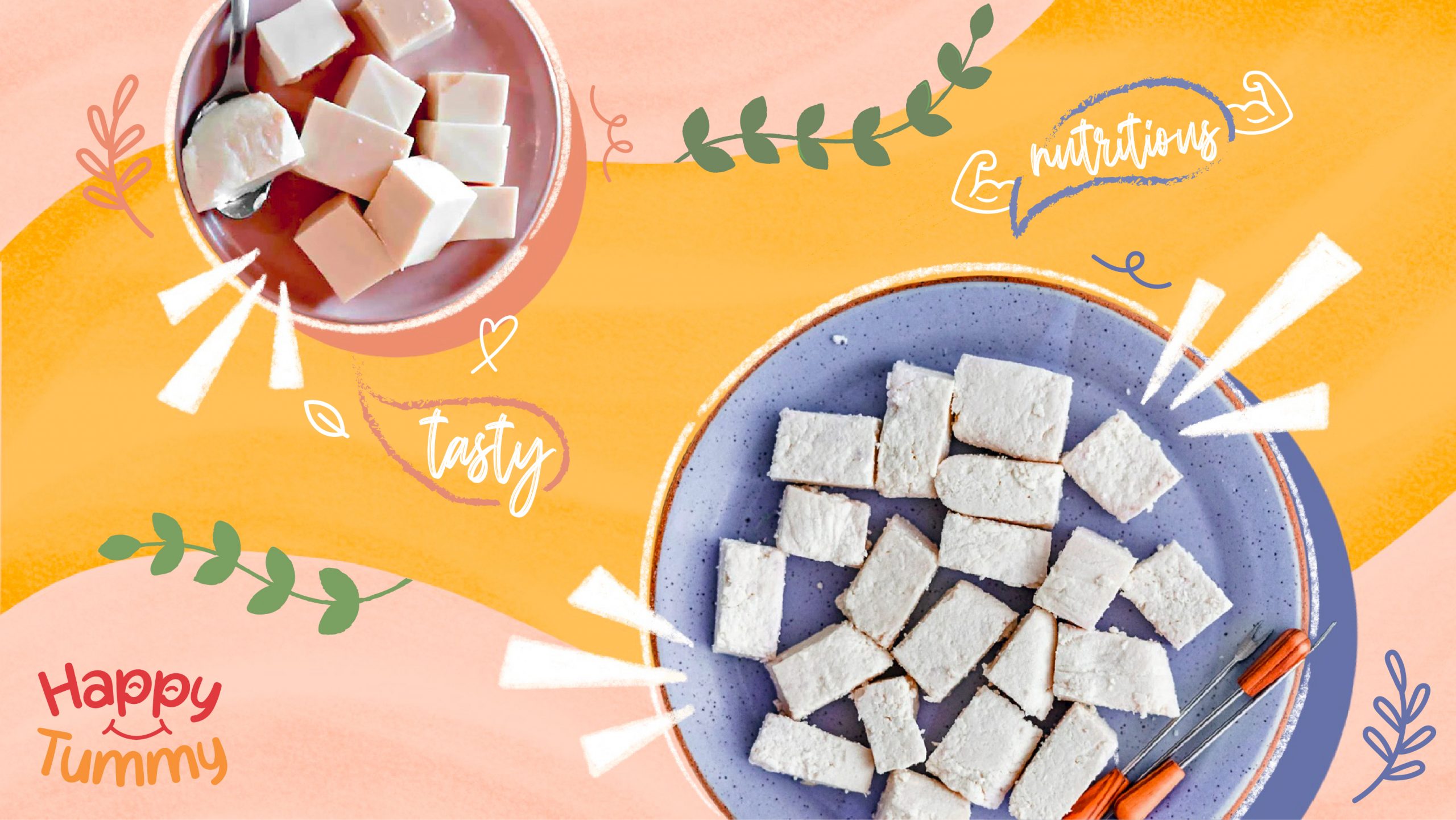Table of Contents
Simmer it, barbecue it, brisket or sauté it; paneer will never fail to impress you. It is an unequaled blend of deliciousness and enormous healthiness. It melds into several different platters. Also, you may incorporate raw paneer into your lettuce by adding some of your preferred vegetables, rock salt, and crumbled black pepper.
In fact, you may use it for a main course, a dessert, and even an appetizer!
Cow paneer is frequently used to add protein to vegetarian foods or offset spicy curries’ blazing heat. Due to several health benefits, the paneer market is expected to reach INR 1,023.4 billion by 2027, growing at a rate of 16.2% between 2022 and 2027.

Paneer is a staple in Indian cuisine and a great source of protein for vegetarians. The result is paneer when milk is emulsified with any food-grade acid, such as citric acid, vinegar, sour curd, or lemon. It is unscented, milky, crisp, and crunchy. The texture of the raw paneer is tight, stiff, coherent, and has a marble-white sheen. Raw paneer’s flavor is sweetish-acidic-nutty.
1. Is Paneer Nutritious?
As it contains several minerals, particularly calcium and phosphorus, as well as a reasonable amount of fat and protein, paneer has tremendous nutritional value, especially in the Indian vegetarian diet. Whey proteins, a rich source of vital amino acids, are responsible for paneer’s superior nutritional value. A and D, fat-soluble vitamins, are also abundant in them.
Every 100 grams of raw paneer contains:
- 265 Calories
- 20.8 Grams of Fat
- 1.2 Grams of Total Carbohydrate
- 18.3 Grams of Protein
- 208 Mg of Calcium
- 100 Grams of Raw Paneer
2. Does Paneer Promote Weight Loss?
Paneer is popular among dieters trying to lose weight, connoisseurs of healthy foods, and athletes because it contains casein, a form of protein that makes people feel satiated for longer. Those who lift weights at the gym must consume large amounts of protein. In addition to being a fantastic source of protein due to paneer’s high nutrition content, it also helps to stave off hunger.
It also helps to improve body metabolism because the insulin level is managed. Cow Paneer is an excellent alternative to traditional cheese because it has fewer calories, making it ideal for anyone attempting to reduce weight.
3. Does Cow Paneer Aid in Digestion?
Paneer also helps with digestion, which is another advantage. Phosphorus, which is abundant in cottage cheese and aids in digestion and the removal of waste from the body, also aids in these processes. Magnesium is also present and acts as a laxative to avoid constipation.
Eating raw paneer can be especially helpful for people who experience irregular bowel movements since it helps waste go through the intestines more readily.
4. Can Eating Raw Paneer Enhances Skin Health?
Selenium, vitamin E, and antioxidants are among the components in paneer, or cottage cheese, which are good for the skin. These nourish the skin and give it a healthy appearance, combating dry skin and dullness. Without exposing the skin to chemicals, including a substantial amount of cow paneer in the normal intake will result in bright and healthier skin.
5. Can Consuming Raw Paneer Strengthen Muscle and Bone?
As a milk byproduct that is also rich in vitamin D, paneer is unquestionably a vital source of calcium. Thus, its calcium and vitamin D abundance makes it a perfect source for enhancing bone density. And phosphorus in paneer supports the health of our musculoskeletal system. Because raw paneer has such a small amount of lactose, it also helps to prevent tooth decay. Be it, little kids or adults, anyone can consume paneer for healthy bones and teeth.
6. Can Eating Raw Paneer Reduce Joint and Muscle Pain?
Omega-3 and omega-6 fatty acids found in paneer benefit those with joint pain because they fight arthritis. Omega-three is also advantageous for expectant mothers because it lowers the risk of miscarriage and other illnesses. Raw Paneer is the body’s leading source of omega-3 and omega-6 fatty acids for vegetarians.
7. Can Diabetic Patients Consume Cow Paneer?
Since paneer includes magnesium, it may be suitable for people with diabetes. Magnesium is thought to control blood sugar levels and avoid any jarring changes in them. It also has a low carbohydrate content, so persons with diabetes can consume it without concern. When combined with an active lifestyle, eating raw paneer in moderation is healthy.
8. Are Cottage Cheese and Paneer the Same Thing?
Cottage cheese and paneer are frequently used interchangeably. But in terms of their composition, preparation, or nature, they differ slightly. First off, the paneer is cooked with lemon and without salt. However, cottage cheese is salty and occasionally includes heavy cream.
Cottage cheese is more solvent and oily than paneer. Although cheese is a nutrient, it is terrible for your heart because it is high in saturated fat and cholesterol. A 100-gram serving of paneer has 1.7 grams of saturated fat and 17 milligrams of cholesterol, compared to 18 grams of saturated fat and 100 milligrams of cholesterol in a 100-gram serving of cheese. Paneer is the apparent winner in this case.
Bottom Line
Have these suggestions persuaded you to add these wonder cubes to your regular plates?
If so, remember to include paneer in your daily diet by consuming delicious dishes like Palak Paneer, Kadai, Paneer Butter Masala, Paneer Lababdar, Paneer Tikka, Chilli Paneer, and the list goes on. The major reason paneer has won our hearts is that it is delicious.
Paneer is a versatile ingredient that can be used in practically any dish, from appetizers to main courses and desserts. The more supple the paneer, the more it melts in your palate. And what you feel is a complete delight!
FAQs
Paneer has a tonne of health advantages; it includes vital elements your body needs, like calcium, protein, magnesium, vitamins, and more. Eating paneer frequently is not harmful because it is low in fat, and vegetarians can gain a lot from it.
You can, of course. Raw paneer has fewer calories and less fat than cooked paneer. So eat it raw if you’re controlling your weight. Enjoy it with a dash of black pepper.
Although paneer offers several health advantages, the body does not respond well to excesses of anything. Therefore, even though we advise eating paneer frequently, do not exceed 200 grams daily. Paneer in large quantities can also be unhealthy for the body.















